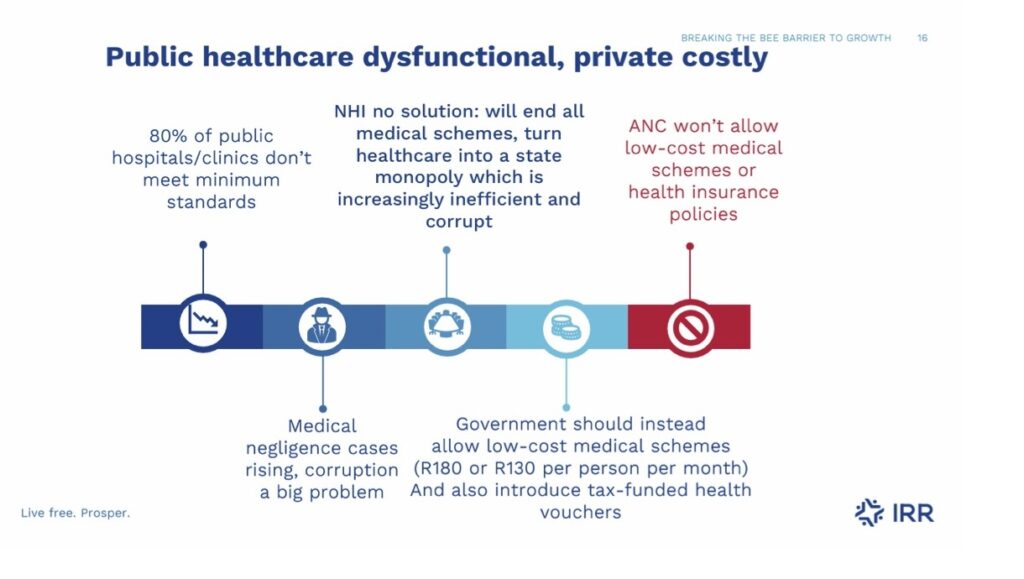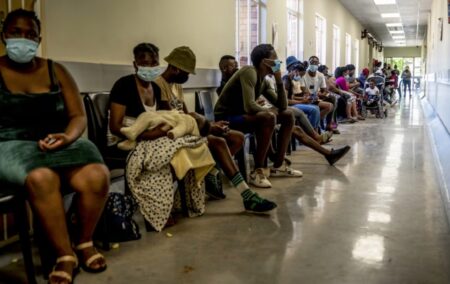Health Minister Aaron Motsoaledi’s recent comments about ‘swart gevaar’ is the most dangerous thing he has said in recent weeks, as the government continues to punt the National Health Insurance (NHI) scheme.
Speaking to the International Pharmaceutical Federation Congress in Cape Town this week, Motsoaledi ominously warned delegates about “strategy” from those opposed to the NHI.
There is no strategy or grand plan to scare South Africans into opposing a policy, which all of us know is a bad idea. When government includes “Fund” in its legislation, South Africans broadly accept that it is euphemism for a looting opportunity.
Motsoaledi still hasn’t come clean on how exactly the National Health Insurance will be funded. The IRR’s parliamentary submission on the then Bill noted that the Department was still using the 2017 White Paper, which is costed using 2010 prices. The White Paper proposes tax increases as the main source of funding for the NHI, with the following proposals:
- A 4% surcharge on taxable income,
- A percentage increase in the VAT rate,
- A new payroll levy, or
- A combination these taxes.
Cost
IRR analysis shows that NHI is likely to cost R700 billion were it to become operational in 2026. Momentum Health recently calculated that – if South Africans were to receive the same quality healthcare as the private sector – NHI would cost the taxpayer R1.3 trillion per year.
The Health Minister should not blame civil society for scare tactics and place the stability of the government of national unity (GNU) in danger, when it is clear that NHI will be an unmitigated disaster. NHI will mean the healthcare sector will operate under uncertain, risky conditions – a one-way path to failure.
Motsoaledi should rather look at how to expand the choice available for South Africans when it comes to healthcare.
The freedom to choose your healthcare provider is not something to fear. It should be embraced. The Council for Medical Schemes has already turned down the option for South Africans to have access to low-cost medical schemes at R150/month, depriving them of the opportunity to choose.
The ANC’s statist orientation won’t disappear as it tries to keep the fight for the National Democratic Revolution alive, while going into government with the so-called “enemies of revolution”. The South African Communist Party is rightfully upset. Its decades-long influence is under threat, even more so than during the days of the “neo-liberal” feast that was GEAR under Thabo Mbeki and Trevor Manuel.
Communists must fall
Writing in Eyewitness News,Yonela Diko, a former ANC Western Cape spokesperson, was bold enough to declare that the ANC should abandon the SACP and fully embrace the GNU.
If it is going to do that, it needs to also abandon collectivist policies like the nationalisation of healthcare and embrace freedom of choice. The ANC is (nominally, at least) the party of freedom. It is also the party that drastically improved the lives of millions of South Africans by increasing the provision of electricity and piped water to lower-income households. It is no mistake that this occurred in the period where the country experienced the highest levels of economic growth in our democracy.

A deadly path
Having written on the poor state of the agency meant to oversee compliance, combined with increasing medico-legal costs for provincial health departments (which is reaching contingent liability of R70 billion) and the lack of low-cost options for millions of South Africans, the country has been set on a path that will be difficult to recover from. There is also a succession of scandals, which does not bode well for NHI.
For example, the Digital Vibes scandal cost the South African taxpayer R150 million, when it deviated from established supply chain processes to award a communications tender for the National Health Insurance to close associates of the former Health Minister Dr Zweli Mkhize.
There was also the Life Esidimeni tragedy, in which 144 mentally disabled patients died because the Gauteng Department of Health moved them due to “cost saving measures”. According to the Health Ombud, the 27 NGOs responsible for the patients operated with invalid licences, and it found that the decision to terminate the contract contradicted the National Mental Health Policy Strategy. To his credit, Motsoaledi apologised on behalf of the government. The formal inquest by Judge Mmonoa Teffo found Gauteng MEC Qedani Mahlangu and the Director of Mental Health responsible for the deaths of at least nine patients.
Investigations by the Special Investigation Unit have saved the Department of Health from nearly R3 billion in irregular medico-legal claims. Claimants in one case reportedly told the SIU that “no records of patients were found” nor had the patients ever visited “any of the health facilities being litigated against”.
“Where there’s a will, there’s a way”
Corrupt and greedy cadres and cronies will find ways to defraud not only the taxpayer, but the poorest of the poor who rely on the taxpayer. The alternative is to put the money government spends on healthcare directly into the hands of South Africans through tax-funded vouchers.
Instead of bogging down on NHI, government should focus on the basics – as it did in the early 2000s – and give South Africans what they want: freedom.
We’d all be considerably poorer without it.
[Photo: VOA file photo]
If you like what you have just read, support the Daily Friend.


